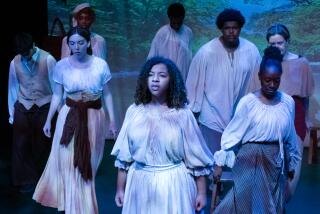Cast of ‘Sarafina’ Rates a Bravo From S. Africa’s Tutu
- Share via
--South African Archbishop Desmond M. Tutu seldom leaves home without it--his fight against apartheid, that is. While in New York, he met with a group of youngsters from his homeland who are also engaged in the struggle. They are the cast of the Broadway musical “Sarafina,” which relates how high school students in Soweto cope with an instance of police brutality--in the country’s expressive mbqanga music. “It’s the kind of story that the child can carry to the world,” Tutu, a Nobel Peace Prize winner, told the cast at a restaurant reception after a performance Saturday night. “ . . . And we say, just how must we speak for the world to hear? . . . We admire you, you young people--young people back home, young people in jail, young people in exile--you have been tremendously courageous and you have shown us up, we the old ones. . . . What price must our children pay before our land is free?”
--Each year, students at Bryn Mawr College in Bryn Mawr, Pa., forget all about Betty Friedan’s brand of feminism--at least for a day. On May Day, that is. Sunday, 100 women took part in their annual ritual, wearing white dresses and colored sashes and dancing around five Maypoles, floral-bedecked fir trees that symbolize immortality and renewal. “May Day is a kind of bonding for women,” said Debra Thomas, a college spokeswoman. Five groups of 20 women competed in a race to be the first to braid a pole with ribbons--while skipping and running. Seniors wearing blue sashes finished first. Students also took part in hoop races and watched satires of Greek and Latin plays. “I don’t think we’re worried about the image it presents,” said Tamara Beauboeuf, of Westtown, N.Y. “We’re not a finishing school.”
--Isaac Neuman, an American who is the only rabbi serving East Germany’s 350 Jewish citizens, will leave the country this month, he said, because of efforts by Jewish leaders and government officials to silence him. The Polish-born survivor of Auschwitz said: “There regularly are informers at every worship service and at every class.” He said Jewish leaders, on “orders from somewhere,” kept a watch on him and hampered him from setting up adult religious education classes. Last September, Neuman, 65, who lives in East Berlin, became East Germany’s first rabbi in 21 years.
More to Read
The biggest entertainment stories
Get our big stories about Hollywood, film, television, music, arts, culture and more right in your inbox as soon as they publish.
You may occasionally receive promotional content from the Los Angeles Times.










